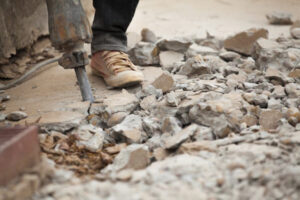When it comes to concrete, the soil has a significant effect on how healthy and fresh your soil really is. The effect of your soil really provides concrete with a protective layer. As a result, understanding just how nuanced the soil under the concrete can impact it overall will allow construction projects to work more effectively and efficiently moving forward. Here are some of the biggest effects that soil can have on concrete.
The Effect Of Clay
It’s clear that clay is a very integral part of the soil around you. However, clay is extremely unstable as a material. As a result, building a concrete foundation on top of clay can become significantly more difficult. Wet clay soil will ultimately expand, and subsequently, the dry soil will contract as soon as the precipitation stops. That being said, this process will then also confound any of your efforts to effectively or efficiently work on concrete. Therefore, the concrete will begin to shift and become significantly weaker. Repairs, replacements, or resurfacing are all different modes you can easily use to remedy any situation where clay soil is part of the building equation.
Peat In Your Soil
Peat will absolutely impact your construction plans. Simply put, peat is made out of dirt, mud, and grime that lingers post rainstorm. Unfortunately, peat is typically found in swamps, wetlands, and bogs. However, peat isn’t necessarily exclusive to these locales. Peat can be found near lakes, rivers, ponds, and even streams. As a result, peat invokes similar issues as clay does with it comes to concrete — leading to cracks and stretching. Therefore, being cognizant of how peat can impact your soil can help you better determine the best strategy to take.
Sand In The Soil
Another potential element in your soil could be sand. Sand can hinder your concrete building project quickly. Unfortunately, sand in the soil is typically found alongside another element that is readily discovered within soil, which is called loam. When both sand and loam are found in your soil, soil erosion becomes all too common. While cracking isn’t necessarily an issue dealing with eroding soil can complicate concrete construction immediately.
Concrete Visions Will Get The Job Done Right
Concrete Visions has been working with clients for over 25 years. Our G&M Services installers are certified with the industry’s major firestop product manufacturers. As part of our firestop service, we can assess abnormal field conditions and, with the manufacturer’s technical support assistance, provide engineering judgments in a timely fashion to comply with contract specifications. Our Field Mechanics undergo ongoing training, including mandatory monthly safety meetings, weekly Toolbox Talks where safety and equipment information is shred, and trainings on safe work standards and safety best practices.

